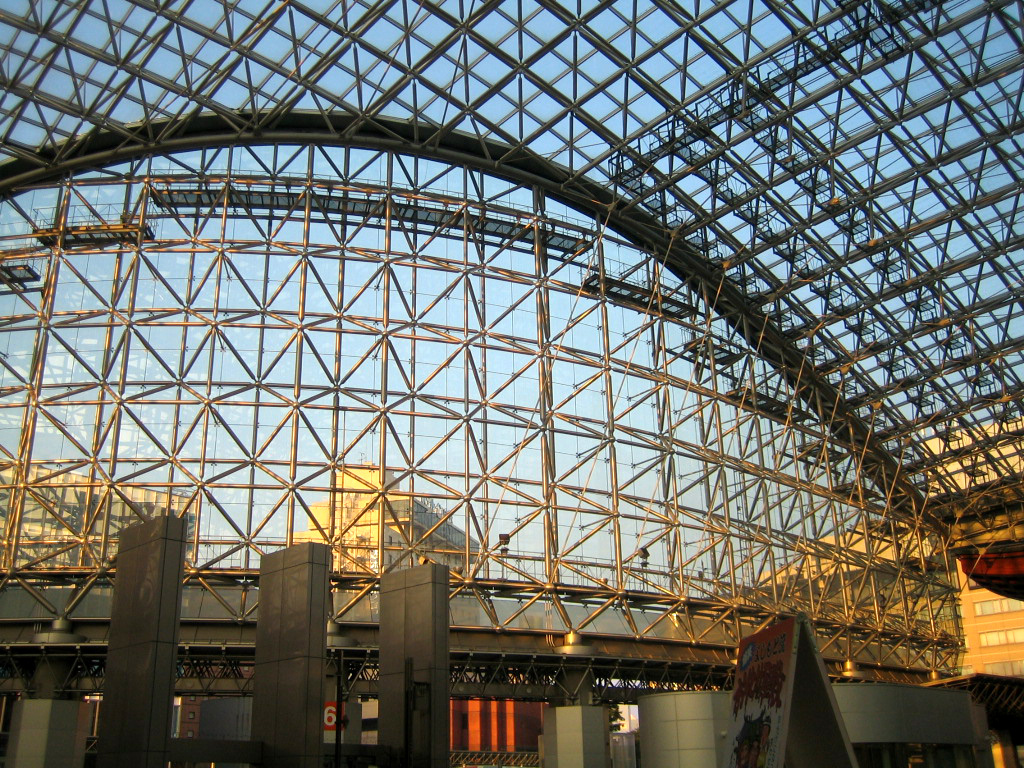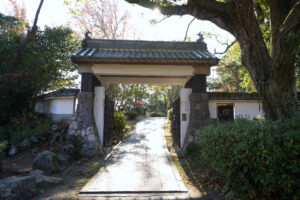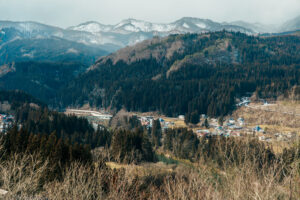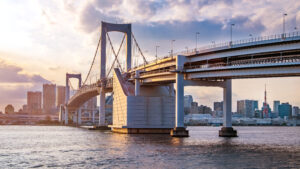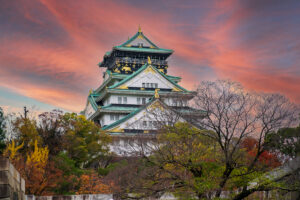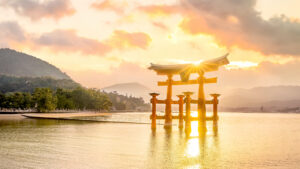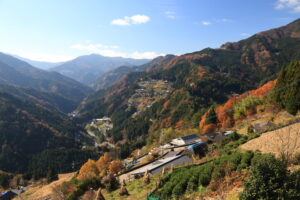Kanazawa Train Station serves as a vital hub connecting travelers to the rich cultural tapestry of Japan. Nestled in the heart of Kanazawa City in Ishikawa Prefecture, this major railway station has become more than just a transit point; it is an architectural marvel and a gateway to the historical and cultural treasures that define this enchanting region. With its blend of traditional and modern influences, Kanazawa Station invites visitors to embark on an adventure through Japan’s past, present, and future.
Kanazawa Train Station: Your Starting Point for Adventure
As the primary railway station in Kanazawa, the station is a critical juncture for those exploring the region. High-speed trains, local services, and even buses converge here, making it an essential stop for both tourists and locals. As travelers disembark, they are immediately enveloped in a sense of anticipation, with the allure of Kanazawa’s historic districts, art galleries, and gardens just a stone’s throw away. The station’s design encourages easy navigation, with clear signage and friendly staff ready to assist newcomers.
With its efficient transportation network, visitors can easily plan day trips to nearby destinations such as Noto Peninsula or the picturesque Shirakawa-go village, recognized as a UNESCO World Heritage Site. Whether you are a first-time visitor or a seasoned traveler, Kanazawa Station provides the perfect launchpad for your journey, ensuring that you have seamless access to the region’s most celebrated attractions.
Moreover, the station is equipped with various amenities, including tourist information centers, luggage storage facilities, and shopping options. This enables travelers to comfortably prepare for their adventures or unwind after a long day of exploration. The bustling atmosphere of the station encapsulates the spirit of Kanazawa, blending the excitement of travel with the allure of cultural discovery.
As you step out of the station, the vibrant streets beckon with the promise of adventure. Artisans, local markets, and historical landmarks await, making every visit a unique experience. Whether you are drawn to the city’s traditional crafts or its cutting-edge modern art scene, Kanazawa is sure to capture your imagination.
In essence, Kanazawa Train Station is more than just a transit hub; it is a lively introduction to the city’s diverse offerings. The moment you arrive, you can feel the energy of Kanazawa infusing the air, instilling a sense of wonder that lasts throughout your stay.
In conclusion, Kanazawa Train Station is your starting point for adventure, effortlessly connecting you to the best experiences that the city and its surroundings have to offer.
Architectural Marvel: The Design of Kanazawa Station
Kanazawa Train Station is an architectural gem, recognized not only for its functionality but also for its breathtaking aesthetics. The striking design features a blend of modern elements and traditional Japanese motifs, making it a visual feast for visitors. The station’s most iconic feature is its enormous wooden "Tsuzumi Gate," which stands as a testament to the craftsmanship of Kanazawa’s artisans. This gate, reminiscent of traditional Japanese drum shapes, symbolizes the city’s rich cultural heritage while welcoming travelers into a modern transport hub.
The main building of the station is characterized by its sleek glass façade, which allows natural light to flood the interior, creating an inviting atmosphere. This contrast between the traditional wooden structures and contemporary design principles reflects Kanazawa’s unique identity—a place where old meets new. Visitors often linger in the spacious atrium, marveling at the intricate details and the harmonious blend of materials that define the station’s character.
At night, the station transforms into a spectacular sight, illuminated by soft lighting that enhances its architectural features. The combination of the Tsuzumi Gate’s silhouette against the night sky and the glimmering glass structures captures the essence of Kanazawa’s dual nature—rooted in tradition but alive with modernity. This visual splendor makes the station a popular spot for photographers and art enthusiasts alike, further solidifying its status as an architectural marvel.
The thoughtful design extends beyond aesthetics, as the station incorporates eco-friendly features that promote sustainability. The use of natural materials and energy-efficient systems showcases Kanazawa’s commitment to preserving its environment while providing modern conveniences. Visitors can appreciate how the station harmonizes with the surrounding landscape, blending seamlessly with the beauty of its natural and urban settings.
As you explore Kanazawa, the station stands as a symbol of the city’s commitment to preserving its cultural heritage while embracing innovation. Its architectural brilliance makes it a must-see destination in its own right, attracting those interested in design, history, and the future of urban spaces.
In summary, Kanazawa Train Station is not only a functional transit point but a stunning example of contemporary architecture infused with traditional elements, making it a remarkable feature of Kanazawa’s identity.
A Brief History: The Evolution of Kanazawa Station
The history of Kanazawa Station is a tale of transformation that mirrors the city’s own evolution. The original station opened in 1886 as a modest facility catering primarily to the local population. Over the decades, it underwent several renovations and expansions to accommodate the growing number of travelers influenced by Japan’s rapid modernization. Each phase of development reflects the changing times and the station’s increasing importance as a transportation hub.
In the post-World War II era, Kanazawa experienced significant urbanization, which necessitated further enhancements to the station. The introduction of the shinkansen, or bullet train, in 2015 marked a pivotal moment in the station’s history, allowing for high-speed connections with other major cities across Japan. This upgrade not only modernized the infrastructure but also revitalized the local economy by attracting tourists and business travelers alike.
The station has also played a crucial role during pivotal historical moments, including the Meiji Restoration and the post-war reconstruction period. Each chapter in its history has seen the station adapt to meet the demands of the era while preserving its core purpose as a gateway to Kanazawa. The station serves as a tangible link to the past, allowing visitors to appreciate the layers of history that define the city.
As part of the city’s effort to preserve its cultural heritage, Kanazawa Station has been recognized as a landmark. In 2016, it received the "Good Design Award," acknowledging its unique design, historical significance, and functional excellence. This recognition has further solidified the station’s role as a key cultural asset, drawing attention from architecture enthusiasts and historians alike.
Today, Kanazawa Station stands as a proud symbol of the city’s resilience and adaptability. The modern facility, combined with its rich history, serves as a reminder of the journey Kanazawa has taken from a small town to a vibrant cultural hub in Japan.
In conclusion, understanding the history of Kanazawa Station provides valuable context for appreciating its significance in the broader narrative of Kanazawa City and its development over the years.
Exploring Kanazawa: A City Rich in Cultural Heritage
Kanazawa is often described as a hidden gem within Japan, offering an abundance of cultural treasures waiting to be explored. The city is renowned for its well-preserved historical districts, traditional crafts, and stunning gardens, all of which reflect the artistry and heritage of the region. One of the most notable areas is the Higashi Chaya District, known for its traditional teahouses where visitors can experience the charm of geisha culture.
Walking through the narrow, lantern-lit streets, you can sense the echoes of the past resonating from the wooden buildings that house shops, galleries, and restaurants. Many establishments in this area offer visitors the opportunity to participate in tea ceremonies or sample local sweets, adding an interactive element to the cultural experience. This district is a testament to Kanazawa’s status as a center for traditional arts and crafts, showcasing the city’s commitment to preserving its rich cultural heritage.
Another must-visit location is the Kenrokuen Garden, often hailed as one of Japan’s "Three Great Gardens." This expansive landscape features a harmonious blend of natural beauty and human artistry, with meticulously pruned trees, serene ponds, and picturesque bridges. Each season transforms the garden, offering different floral displays and seasonal activities, making it a favorite destination for both locals and tourists year-round.
Kanazawa’s rich history is also evident in its museums, such as the 21st Century Museum of Contemporary Art, which showcases cutting-edge works from both Japanese and international artists. This juxtaposition of modern art within a city steeped in tradition highlights Kanazawa’s dynamic creative landscape, attracting art lovers from around the world.
Additionally, Kanazawa is home to several historical sites, including Kanazawa Castle and the Myoryuji Temple, also known as the Ninja Temple. These landmarks provide insights into the region’s feudal past, offering guided tours that delve into the fascinating stories and architectural features of each site.
In conclusion, exploring Kanazawa is an enriching experience that reveals a city steeped in cultural heritage, where every corner offers a glimpse into Japan’s artistic legacy and historical significance.
Must-Visit Attractions Near Kanazawa Train Station
Located strategically in the city, Kanazawa Train Station provides easy access to several must-visit attractions that showcase the diversity of experiences Kanazawa has to offer. Just a short walk from the station, the Kanazawa Port Ono-machi Market awaits, where visitors can immerse themselves in the bustling atmosphere of a traditional Japanese market. The market is a haven for food lovers, offering fresh seafood, seasonal produce, and local delicacies that reflect the region’s rich culinary heritage.
Another iconic attraction nearby is the Kanazawa Castle Park. Situated just a few minutes from the station, the park surrounds the historically significant Kanazawa Castle, which dates back to the 16th century. The castle grounds invite visitors to stroll through beautifully landscaped gardens, admire the stone walls, and enjoy breathtaking views of the surrounding area. It’s an ideal spot to relax and soak in the historical ambiance of the city.
For those interested in art, the 21st Century Museum of Contemporary Art is also within walking distance. This museum features innovative exhibitions and installations from contemporary artists, providing a stark contrast to Kanazawa’s historical sites. Its unique architecture and engaging collections make it a popular destination for art enthusiasts and casual visitors alike.
Kanazawa’s famed Kenrokuen Garden, one of the most celebrated gardens in Japan, is also nearby. A short bus or taxi ride from the station will transport you to this tranquil oasis, where you can explore meticulously maintained landscapes and seasonal blooms. The garden’s design principles embody the essence of Japanese aesthetics, making it a perfect spot for photography and quiet reflection.
For those seeking a bit of adventure, the Nagamachi Samurai District is a short distance away. This historic neighborhood once housed samurai families and features well-preserved residences that offer insights into the lives of these noble warriors. Visitors can wander through the narrow streets, visit museums, and even partake in samurai experiences, like wearing traditional attire.
In summary, the attractions near Kanazawa Train Station provide a rich tapestry of experiences that cater to diverse interests, making it an ideal base for exploring the city’s cultural and historical offerings.
The Vibrant Local Culture: Art and Festivals Await
Kanazawa’s local culture is vibrant and multifaceted, characterized by its rich artistic traditions and lively festivals. The city is home to several skilled artisans who specialize in traditional crafts such as gold leaf production, Kaga Yuzen silk dyeing, and pottery. Visitors can witness these artisans at work in local workshops, where they often offer hands-on experiences, allowing you to create your own piece of art or craft. This immersive approach not only honors the city’s artistic heritage but also gives visitors a unique souvenir to take home.
Throughout the year, Kanazawa hosts a variety of festivals that celebrate its cultural identity. One of the most notable events is the Kanazawa Hyakumangoku Matsuri, which takes place in June. This festival commemorates the Edo period and features vibrant parades, traditional music, and dance performances. Locals donning historical costumes take to the streets, creating a lively atmosphere that draws in crowds from near and far.
In addition to the Hyakumangoku Matsuri, the city celebrates the Ishikawa Prefectural Arts Festival, showcasing local talent across various artistic disciplines. This festival promotes not only visual arts but also performing arts, music, and theater, reflecting Kanazawa’s commitment to nurturing creativity and cultural expression. Visitors can attend performances and exhibitions that highlight the diversity of Kanazawa’s artistic community.
Kanazawa’s cultural scene is further enriched by its numerous galleries and museums dedicated to showcasing both traditional and contemporary art. The D.T. Suzuki Museum, for example, pays homage to the influential philosopher and writer who promoted Zen Buddhism and Eastern thought in the West. The museum’s serene design and thought-provoking exhibitions make it a must-visit for those interested in philosophy and spirituality.
The city’s vibrant culture also extends to its culinary scene, where food is considered an art form. Local dishes such as Kaga Cuisine and Kanazawa-style sushi highlight seasonal ingredients and traditional cooking techniques. Many restaurants and eateries offer cooking classes, giving visitors a chance to learn about and participate in the culinary arts that are integral to the local culture.
In conclusion, Kanazawa’s local culture is a rich tapestry of art and festivals that invite visitors to engage with the city’s heritage and creativity. Whether through hands-on experiences, lively celebrations, or culinary delights, there’s an abundance of opportunities to immerse yourself in the vibrant cultural landscape of Kanazawa.
Culinary Delights: Food Experiences at Kanazawa
Kanazawa is a culinary paradise, celebrated for its diverse and exquisite food offerings that reflect the region’s natural bounty and rich agricultural traditions. The city’s location near the Sea of Japan ensures an abundance of fresh seafood, which is a cornerstone of Kanazawa’s cuisine. Visitors can indulge in local specialties such as sashimi, crab, and other seafood delicacies, often prepared with meticulous care and attention to detail.
One of the most iconic dishes to try is Kanazawa-style sushi, known for its emphasis on freshness and flavor. The sushi restaurants near Kanazawa Station serve a variety of nigiri and maki rolls made from locally sourced fish and seasonal ingredients. Many establishments even allow diners to sit at the counter and watch skilled sushi chefs at work, providing an authentic dining experience.
Another culinary highlight is Kaga Cuisine, a traditional style of cooking that showcases seasonal ingredients from the surrounding region. Dishes are often served in elaborate multi-course meals known as "kaiseki." These meals not only provide a feast for the palate but also for the eyes, as each dish is presented with artistic flair. Visitors can experience Kaga Cuisine at numerous restaurants that specialize in this culinary tradition, immersing themselves in the flavors and presentation that define the region.
For those looking to explore Kanazawa’s culinary scene further, food tours and cooking classes are widely available. Guided tours take visitors to local markets, where they can sample street food, purchase ingredients, and learn about the culinary customs unique to Kanazawa. Cooking classes allow participants to create their own dishes under the guidance of experienced chefs, providing a hands-on experience that connects you to the local culture.
Kanazawa also features several stylish cafes and patisseries, where visitors can enjoy artisanal coffee and delectable desserts. Many establishments incorporate local ingredients into their recipes, showcasing the creativity and innovation of the city’s culinary scene. From sweet treats to savory bites, there’s something for everyone to enjoy.
In conclusion, the culinary delights of Kanazawa offer a delightful journey through the region’s flavors and traditions, inviting visitors to savor the artistry of local chefs and the freshness of seasonal ingredients.
Accessibility: Getting to Kanazawa Station Easily
Kanazawa Train Station is well-connected and easily accessible, making it a convenient point for travelers arriving in the city. The station serves as a major stop on the Hokuriku Shinkansen line, which connects Kanazawa to Tokyo, Nagoya, and other key destinations across Japan. With multiple daily departures, travelers can choose from a range of schedules to suit their travel plans. This high-speed rail service has significantly enhanced accessibility to Kanazawa, making it a popular choice for both domestic and international tourists.
In addition to the shinkansen, Kanazawa is accessible by limited express trains from cities such as Osaka, Kyoto, and Takayama. Regular local train services also operate within the region, allowing for smooth access from nearby towns and attractions. The efficient rail system ensures that visitors can reach Kanazawa from various parts of Japan with ease and comfort.
For those traveling by air, the Noto Airport is situated approximately an hour from Kanazawa City. Regular flights connect the airport to major cities, providing an alternative means of reaching the city. Upon arrival, travelers can take a bus or taxi to Kanazawa Station, ensuring a seamless transition from air travel to rail travel.
Furthermore, Kanazawa Station is equipped with modern facilities and amenities that enhance accessibility for all travelers. Elevators, escalators, and barrier-free pathways ensure that individuals with mobility challenges can navigate the station comfortably. The presence of information centers staffed by English-speaking personnel allows non-Japanese speakers to receive assistance and information, making the travel experience more enjoyable.
The station’s location within the city also makes it easy for visitors to explore Kanazawa on foot. Many key attractions, including museums, parks, and shopping areas, are within walking distance, allowing for leisurely exploration of the city’s cultural landscape. Additionally, local buses and taxis provide convenient options for reaching destinations further from the station.
In summary, Kanazawa Train Station’s accessibility contributes to the city’s appeal as a travel destination, ensuring that visitors can easily reach and explore all that Kanazawa has to offer.
Seasonal Attractions: What to See Throughout the Year
Kanazawa boasts a variety of seasonal attractions that reflect its natural beauty and cultural significance throughout the year. Each season brings its own unique charm, offering visitors varied experiences and stunning landscapes. Spring is particularly enchanting, as the cherry blossoms burst into bloom, transforming the city into a pastel wonderland. Popular viewing spots, such as Kenrokuen Garden and the city’s parks, attract locals and visitors alike, who gather to celebrate the transient beauty of sakura.
As summer unfolds, Kanazawa welcomes vibrant festivals and lively events that showcase the city’s cultural heritage. The Kanazawa Hyakumangoku Matsuri takes center stage, featuring parades, traditional music, and dance performances. The warm weather also allows for outdoor activities, such as hiking in the nearby mountains or exploring the scenic coastal areas, providing ample opportunities for adventure amidst the region’s natural beauty.
Autumn in Kanazawa is marked by stunning foliage that paints the city in warm hues of red, orange, and yellow. The changing landscape invites visitors to explore the scenic parks and gardens, where the autumn leaves create breathtaking backdrops for photography. Additionally, the Kanazawa Art and Craft Festival celebrates local artisans and their creations, offering visitors a chance to shop for unique handcrafted souvenirs.
Winter brings a different magic to Kanazawa, as the city experiences occasional snowfall, transforming it into a winter wonderland. Kanazawa’s traditional architecture, particularly in areas like the Higashi Chaya District, takes on a picturesque quality as the snow blankets the rooftops. The winter months also see the arrival of seasonal delicacies, including winter seafood, which can be enjoyed in local restaurants. Festivals celebrating the New Year and winter traditions further enrich the cultural experience during this season.
Throughout the year, Kanazawa also hosts various exhibitions and performances, showcasing local talent and cultural events. The 21st Century Museum of Contemporary Art frequently features rotating exhibitions, while local theaters host performances of traditional arts, ensuring that there’s always something to see regardless of the season.
In conclusion, Kanazawa’s seasonal attractions provide an ever
